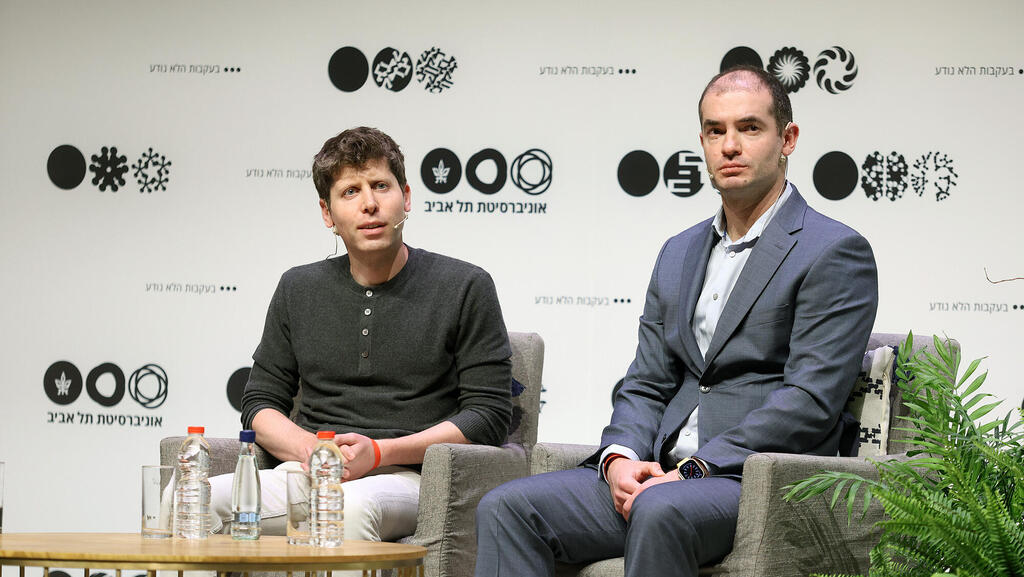
Analysis
Uncharted territory: Israeli high-tech at crossroads, teetering on the edge of decline
Unprecedented challenges loom over Israeli high-tech industry as investments dwindle, startup numbers plummet, and concerns over governance cast shadows on future prospects. The race to secure the nation's technological dominance hangs in the balance
1. On stage sat Sam Altman, CEO and one of the founders of OpenAI, the developer of the GPT artificial intelligence engine. The hall at Tel Aviv University was packed to capacity; more than a thousand people came to hear one of the biggest technology stars of the moment on a short visit to Israel. To my surprise, Altman was not the star of this conversation; the one who overshadowed him, with sharp and spirited answers, was Dr. Ilya Sutskever, the Chief Scientist of OpenAI.
Sutskever (37) is what we like to sometimes call a former Israeli. He immigrated to Israel from the Soviet Union in the early nineties, at the age of five, with his mother and father, who is a computer engineer himself. He grew up in Jerusalem and studied computer science at the Open University while in high school. He could have easily become one of the leading scientists or high-tech professionals in Israel, but before finishing high school, his family moved to Toronto, Canada. There, he completed a bachelor's degree, a master's degree, and a doctorate in computer science, founded a startup, sold it to Google, worked there, and in 2015, he was one of the founders of OpenAI, and possibly, or perhaps even probably, changed the world. He has already become one of the most cited scientists in history, with more than 400,000 citations in academic articles.
I thought a lot about his biography precisely because of Sam Altman. At the end of the conversation, Altman was asked how he sees Israel fitting into the global race to develop artificial intelligence. He said that there are two impressive things about the Israeli high-tech workforce. One of them is almost a cliché, something about the Israelis' drive to change the world. But the second thing he said is very important, especially now. It's not just the number of talented individuals, Altman explained, but rather the talent density—the proportion of talent relative to the population. This can be translated as "the density of talent" or perhaps better as "the concentration of talent." It's not just a large number of entrepreneurs and inventors relative to the population; it's also the proximity, the constant interaction, their ability to inspire each other, to meet, and to continually generate new ideas and technologies. Density is good, while sparsity is bad.
When Sutskever left Israel, the local ecosystem was less developed. His chances of reaching a significant position were very small. Today, the ecosystem has become much more developed, and the chances of success are much greater. There are people here who lead various branches of technology. They don't have to immigrate to Canada or the United States; they are significant and influential from within their own country. It was not without reason that Altman considered it important to include Israel in his well-publicized tour around the world. However, this point we have reached, might be something we are observing in hindsight, not in the present. We may be entering an era of sparsity.
2. Alan Feld took the opposite route from Sutskever: in the mid-nineties, he left Canada, immigrated to Israel, and became a significant figure in the local technology sector. Feld is a founding partner in the venture capital fund Vintage, which has so far invested in more than 5,500 Israeli, American, and European companies and manages assets worth more than $3.6 billion. He possesses extensive knowledge and experience in the industry. Last week, at the Eli Hurvitz conference, he painted a disturbing picture: "I've been an investor for 29 years. I've never been as worried about the future of Israeli high-tech as I am today," he said, then proceeded to present the numbers.
First, the money. The five years leading up to 2022 were record years for Israeli high-tech. In 2022, Israeli venture capital funds raised more than $4 billion, and companies raised over $17 billion. However, 2023 seems to be the worst year for the local industry in terms of raising capital in the past fifteen years. While investments have decreased globally due to increased interest rates and the attractiveness of less risky avenues, the damage to Israel is more significant. According to Feld's data, investments in the first quarter of the year decreased by 60% in Israel, compared to 50%–40% decreases in the United States and Europe. This is partly due to investors evaluating investments based on environmental, social, and governmental (ESG) criteria. When doubt arises regarding the quality of governance in Israel, we face a problem.
Second, the number of new Israeli startups is steeply declining. This has been happening for several years and is not a new phenomenon. In 2013, which was a record year, almost 1,400 startups were established in Israel. In 2022, the number dropped to only about 600, a decrease of 14% per year. This year, it is estimated that only about 400 new startups will emerge. The last time such numbers were seen was in 2009 during the global economic crisis. This trend is not unique to Israel; according to data from Start-Up Nation Central, the number of new startups worldwide has been decreasing by 17% per year since 2017. However, there are specific reasons in Israel as well. For example, startups find it challenging to compete for quality personnel against large companies whose presence in Israel has increased significantly over the past decade. The decline in the number of startups is also a sign of the maturation of Israeli high-tech.
Nevertheless, new startups represent the future growth potential of the high-tech industry, so the continuous decrease in their number is concerning. Additionally, recent legislation regarding the judicial system has created great uncertainty throughout the economy. There is fear about the independence of the courts, which drives away not only investors but also the entrepreneurs themselves. Entrepreneurs require a comfortable and safe work environment with a sense of support from the government and the surrounding environment, as opposed to political unrest and protests. Consequently, it is not surprising that more Israeli companies registered abroad this year, which will affect employment levels and tax revenue.
Therefore, according to participants at the Eli Hurvitz conference, we may be approaching a point of no return. Professor Eugene Kandel, former close economic advisor to Benjamin Netanyahu and current co-chairman of the Start-Up Nation Central Policy Institute, summed it up well: "It's not that someone here shouts and is purposefully doing something that scares away investors. Investors don't come because they see uncertainty here and don't understand why we are creating it for ourselves. We are running out of time. There's a flywheel effect, and once it loses momentum, it takes a lot of effort to regain it. And over time, it's not certain that we will have the energy to do so... If we don't compete in high-tech, we will end up like Nokia in 2009. In 2009, Nokia was the world's largest mobile phone manufacturer. By 2012, it didn't produce a single cell phone because it exited the market. It only took three years. We definitely don't want to be in that situation."
Here are the thoughts a senior government official, who prefers not to be quoted, shared with me this week: "When a venture capital fund considers investing in Israel but then decides not to decide, it is actually diverting the money elsewhere, and it's over in an instant. For seven years, you won't see that money again. It's no longer a simple move, and it will be very difficult to recover that money. Meanwhile, countries like Cyprus are developing high-tech ecosystems, and other countries are closing the gap. We are a startup nation with many shortcomings now. We are no longer what we used to be, and the world is catching up with us in a positive way, siphoning Israeli talent."
Related articles:
3. If investments flow to other countries and fewer startups are established, we will lose the concentration of talent that makes Israeli high-tech what it is.
This issue extends beyond the migration of money. If the Israeli public feels that the government threatens the values they want to instill in their children and if better opportunities become evident elsewhere, as was the case with the Sutskever family, talents will also migrate. I don’t think most Israelis working in high-tech will leave Israel, even if living here becomes really challenging. Migration is usually a last resort and comes with significant personal and family costs. However, there will always be individuals who choose to leave. Some are already doing so. As personal quality of life diminishes and professional opportunities dwindle, more and more people, including entire families, will consider leaving together with their 16-year-olds who could invent the next big thing.
High-tech isn’t the be-all and end-all, of course. Culture, spiritual life, and simple activities like going to the beach are equally important. However, Israeli high-tech is what sets Israel apart as a semi-developed country, rather than just a developing one. Without a strong and growing high-tech sector, we risk falling into the middle-income trap, similar to Hungary—a country that relies mainly on cheap labor with low skills and lacks global competitive advantages. Such a country can sustain primarily low-tech factories and workers with below-average salaries. The leading entrepreneurs will seek opportunities elsewhere, and we will be left mainly with an unskilled workforce. We will become like Nokia, “has beens” that disappeared inexplicably. Now, right now, is the time to fight.
The writer is a news journalist at Kan.
